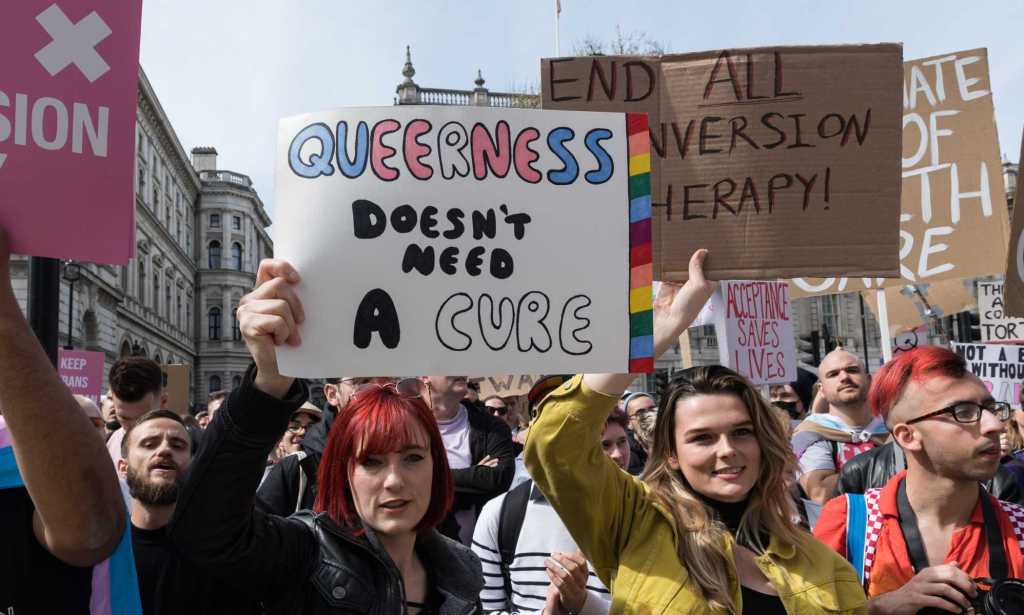Conversion therapy victims told to ‘buy a rugby shirt’ to turn straight, new research reveals

Conversion therapy survivors have described the experience in new research. (Credit: Getty Images)
A gay man was told buying rugby shirts and going for pints with his dad would help turn him straight, research into so-called conversion therapy in Ireland has found.
The research also highlighted the traumatic effects of conversion practices on LGBTQ+ people in the country, where victims described their experiences as “horrendous, damaging and harmful”.
Seven people were interviewed in-depth about their experiences, five of whom suffered conversion therapy in Ireland and two while two abroad.
One gay man said he was encouraged to buy rugby shirts and “go for pints with my dad and talk about sports and to find something like that in common”.
He added: “I was encouraged to act like those I respected in terms of being masculine and stuff like that …the idea (being) that you were attracted to these people because you wanted to be them.”
Another victim told the researchers that he was prescribed anti-depression medication as part of their “treatment”.
‘I had a lot of internalised homphobia. They played on that’
Now, however, he believes this was not to treat depression, but for a completely different reason.
“What I now suspect is that the real reason I was being given these, was because they are libido suppressants. It had nothing to do with their properties for any form of depression or any form of anything else,” he explained.
Other experiences the researchers were told about include conversion-therapy practitioners turning people’s internalised homophobia on themselves, especially if they were religious.
“I hope this doesn’t sound like I’m blaming myself in any way, but you know I certainly was very clear that I didn’t want to be gay. I mean I did have a lot of internalised homophobia. I think they played on that,” one victim said.
Many religious people who suffered conversion therapy were told their sexuality and/or gender identity was a phase which would “pass”.
As one victim explained to the researchers, their sexuality was never going to change and the conversion practices only subverted their identity for a short period.
They said: “Of course, none of that works in terms of changing my innate personality or sexuality. They did have momentary effects in terms of celibacy but celibacy is not the same as changing what is.
“For me, it’s exactly the same as I love junk food and I cannot eat it, it doesn’t mean I don’t like KFC, I can go on a diet. So, it’s the same thing in life, all diets come crashing down. It’s the same really, in terms of these conversion therapies.”
‘Find a girl and get married’
The report, released on Friday (17 February), was conducted by the School of Nursing and Midwifery at Trinity College Dublin and will inform the Irish government’s proposed legislative ban on conversion therapy – set to be introduced later this year.
“Conversion therapies” are practices that seek to change someone’s sexuality and/or gender identity. The methods used can range from counselling to physical violence, shock therapies and corrective rape.
This is despite the fact that there is no medical or psychological evidence to support being able to change someone’s sexuality or gender.
The research included an anonymous online survey, which attracted 278 responses.
Of these, 70 people said they were offered conversion therapy and 38 said they were actually exposed to the practices.
The research outlined that there are four main pathways to people attending conversion therapy. Victims were either offered it by somebody and took up the offer, sought it themselves, were exposed to it against their will, or it emerged as part of a therapeutic process.

Parents, guardians and other family members were the most likely to offer conversion practices to victims, it was revealed.
A majority of those interviewed said they were also encouraged to enter into heterosexual marriages, the report stated, often with disastrous impacts on victims’ lives and the lives of their spouses.
“While two participants’ heterosexual relationships were short-lived, two got married – with negative consequences for the participants, their spouses and for one of [their] children,” the researchers stated.
As one victim said: “Their advice to me was… not to enter the priesthood, but to find a girl and get married. That I could be cured of this. And it was completely possible to cure, change is possible. And I could be cured and the way to make me cured is to get married.
“I remember they were very clear on things like [saying] my libido has been moved wrong, that there’s a right way for your libido to be and a wrong way. And every time I sin with another man, I’m putting my libido on a wrong track, and the best or most effective way to counteract that is to get married.”
In conclusion, the research’s authors noted a ban on conversion therapy would have no impact on religious freedom and the right to “inflict potential harm based on religious teachings” is not a protected belief.
They added that while the findings provide evidence that conversion practices exist in Ireland, the sample sizes for both the survey and interviews are small and further research, using a larger number of people, is needed.
Following publication of the research, National LGBT Federation (NXF) board director, Adam Long, who represents the organisation on the Steering Group to Ban Conversion Practices, stated: “The disturbing findings contained in this timely report underlines, in very stark terms, why this inherently abusive and dehumanising so-called therapy requires a full ban both North and South – a prohibition that covers everyone in our LGBT[Q]+ community and where there are no loopholes that would enable the abuse to continue under false guises.
“It’s now time for Ireland to join the growing number of other countries – Spain, just yesterday – in legislating for a comprehensive ban, and we look forward to the government now bringing forward its proposals to that end.”
How did this story make you feel?

